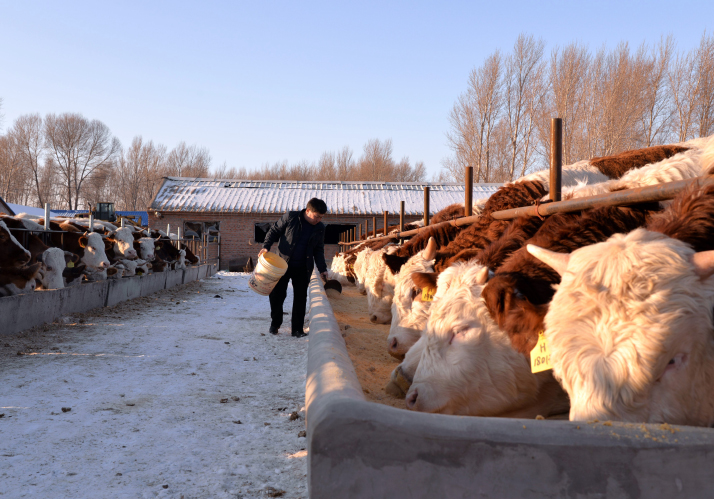Dashing toward the finish line
- By Wang Hairong
 0 Comment(s)
0 Comment(s) Print
Print E-mail Beijing Review, March 16, 2020
E-mail Beijing Review, March 16, 2020

A destitute county without a musical tradition, Zheng'an in Guizhou Province in southwest China is an unlikely home for many of the world's top-notch guitars. However, the mountainous area with little arable land has bloomed into the largest guitar production base in the world, growing from a seed brought in by native resident Zheng Chuanjiu.
In the 1990s when many people from this impoverished county flocked to economically advanced places to seek a better life, Zheng went to Guangzhou in the southern province of Guangdong, where he joined a guitar factory after trying an assortment of jobs. In seven years or so, he worked his way from an ordinary worker on the production line to a management staff.
In 2007, he founded his own company in Guangzhou. Later, at the invitation of the local government, he set up a guitar company in Zheng'an in 2012. His business prospered, which inspired others to follow suit. More guitar companies have sprouted up in the county.
As of the end of 2018, the guitar industry had created more than 13,768 jobs, helping nearly half of the employees to shed poverty, according to data released by the county's International Guitar Garden, the industrial park where guitar producers are based. Last year, some 70 companies in the county produced about 7 million guitars, which were sold in more than 30 countries and regions worldwide, Zheng'an Mayor Wu Qi told the media.
On March 3, Zheng'an declared that it had moved out of poverty as a whole, thanks to proactive efforts including fostering industries such as guitar making and tea planting.
Approaching targets
Some 300 days before China's deadline for eliminating absolute poverty, encouraging news has been reported from many places in the country. On March 5, Inner Mongolia Autonomous Region in north China announced that all its impoverished counties had shaken off poverty. By the end of February, eight provincial-level regions had made such declarations, according to the State Council Leading Group Office of Poverty Alleviation and Development.
Of the 832 government-designated impoverished counties, only 52 are still mired in poverty, which indicates that overall regional poverty has been basically eradicated, said President Xi Jinping at an anti-poverty symposium on March 6.
The number of poor people had declined from 98.99 million at the end of 2012 to 5.51 million at the end of 2019, with the poverty headcount ratio dropping from 10.2 percent to 0.6 percent. After completing the task of eliminating absolute poverty at the end of this year, China will achieve the goals set in the UN 2030 Agenda for Sustainable Development a decade ahead of schedule, he added.
Xi stressed that moving all rural residents living below the current poverty line out of the destitute situation by the end of 2020 is a solemn pledge made by the Central Committee of the Communist Party of China (CPC) that must be fulfilled on time. He said unremitting efforts should be made to secure a decisive victory against poverty despite the novel coronavirus outbreak.
He also pointed out that moving out of poverty is not an end in itself, but the starting point of a new life, so poverty alleviation should be synchronized with rural vitalization.
After the launch of the reform and opening-up policy in 1978, China has made great progress in alleviating poverty. In 2012, the 18th CPC National Congress set the goal of completing the building of a moderately prosperous society in all respects by 2020.
In 2013, Xi first put forward the concept of targeted poverty alleviation, which requires tailored relief efforts for different regions and individuals. In November 2015, the central authorities made a decision to eliminate absolute poverty by 2020.
In the past seven years, Xi has inspected poverty-stricken areas every year. He spoke about his findings at the symposium. In the first few years, mountain roads were bumpy, and village streets were pot-holed, dusty on sunny days and muddy on rainy ones. Poor families lived in dilapidated houses, and some of them could afford to eat meat only a few times a year. Changes have taken place in recent years, Xi said, adding that during more recent visits, he found that new houses have mushroomed and once impoverished people have adequate food and clothing.
Challenges to overcome
Despite the achievements, Xi said the remaining tasks of poverty alleviation are arduous. There are still 52 poverty-stricken counties and 2,707 poverty-stricken villages. Although the total number of people still living in poverty is not large compared with the past, their problems are difficult to tackle. The elderly, the sick and the disabled account for 45.7 percent of the remaining poor, Xi said.
The novel coronavirus epidemic poses new challenges. Due to transportation restrictions during the outbreak, agricultural products of some impoverished areas could not hit the market, while production materials could not be shipped in. Some poverty alleviation projects were suspended.
Without effective countermeasures, the income of migrant workers, many of whom are bread earners of poor families, would decrease due to the disruptions caused by the epidemic, Xi said. According to the State Council Leading Group Office of Poverty Alleviation and Development, in 2019, 27.29 million migrant workers were registered as impoverished.
Xi also noted that nearly 2 million people out of poverty face the risk of falling back to poverty, and nearly 3 million people on the verge of poverty may become poor again.
The president called for measures to minimize the impact of the epidemic and efforts to consolidate the achievements of poverty alleviation. Focus should be put on regions in deep poverty to ensure the remaining impoverished people will rise out of poverty, he said.






Go to Forum >>0 Comment(s)